Black History, Religion
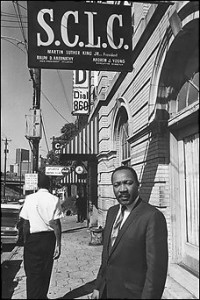
SCLC Founder Dr. M.L. King Jr.
The Southern Christian Leadership Conference was formed in 1957 just after the Montgomery Bus Boycott had ended. The Southern Christian Leadership Conference’s (SCLC) main aim was to advance the cause of civil rights in America but in a non-violent manner. From its inception in 1957, its president was Martin Luther King – a post he held until his murder in 1968.As its title suggests, the input into the SCLC came primarily from the church.
The church played a major part in the lives of African-Americans in the South and church leaders played a significant role in each black community in all parts of the South. Martin Luther King was a Baptist minister at Dexter Avenue in Montgomery at the time when Rosa Parks made her famous stand against bus law in December 1955. He became head of the MIA (Montgomery Improvement Association) and played a key role in the boycott – even driving the boycotters to work to ensure that they did not need to use a bus. (more…)
Black History, Religion
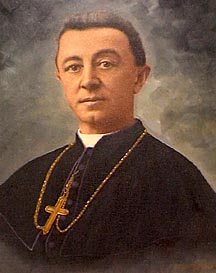
James Augustine Healy the first black bishop ordained in the U.S.
James Augustine Healy, was appointed February 12, 1875, and consecrated as Bishop of Portland (Maine) at the Cathedral of the Immaculate Conception (see Cathedral) on June 2, 1875. James Augustine Healy became the first black bishop ordained in the United States. He was the son of an Irish immigrant, Michael Healy, who became a prosperous plantation-owner in Georgia, and a mulatto woman who was actually a slave.
James was educated in northern schools and later attended the newly established Holy Cross College. There he made his decision to enter the priesthood. He furthered his studies in Montreal and Paris where he was ordained in 1854 at the Cathedral of Notre Dame. After ordination Father Healy was assigned to Bishop John Fitzpatrick’s Boston Diocese. He remained there serving first at the House of the Angel Guardian, then as Chancellor of the Diocese and finally as pastor of St. James Church. When his appointment came as the second Bishop of Portland, he was forty-five years old. (more…)
Black History, Religion
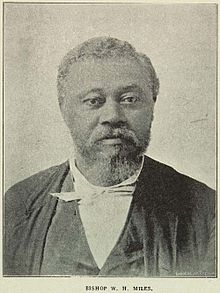 William Henry Miles (1828-1892) was a founder and the first senior bishop of the Colored Methodist Episcopal Church in America, a Methodist denomination formed in 1870 to serve African-American Methodists in the American South. Miles College in Birmingham, Alabama is named in his honor.
William Henry Miles (1828-1892) was a founder and the first senior bishop of the Colored Methodist Episcopal Church in America, a Methodist denomination formed in 1870 to serve African-American Methodists in the American South. Miles College in Birmingham, Alabama is named in his honor.
Miles was born in Springfield, Kentucky. He was a slave of Mrs. Mary Miles; when she died in 1854, she willed William his freedom (although he was not freed until 1864)
Black History, Politics, Religion
 The Nation of Islam was founded in Detroit, Michigan in July, 1930 by Wallace Fard Muhammad, also known as W. D. Fard Muhammad (1877–1934). The N.O.I. teaches that W. Fard Muhammad is both the “Messiah” of Judaism and the Mahdi of Islam. Within one year, he had approximately 25,000 followers who knew him as Prophet W.D. Fard, at Mosque of Islam #1.
The Nation of Islam was founded in Detroit, Michigan in July, 1930 by Wallace Fard Muhammad, also known as W. D. Fard Muhammad (1877–1934). The N.O.I. teaches that W. Fard Muhammad is both the “Messiah” of Judaism and the Mahdi of Islam. Within one year, he had approximately 25,000 followers who knew him as Prophet W.D. Fard, at Mosque of Islam #1.
Fard’s assistant minister Elijah Muhammad succeeded him as head of the movement in 1934. Because of dissension within the Detroit temple, he moved to Chicago where he established Mosque No. 2. During World War II, he advised followers to avoid the draft, as he said the US did nothing for blacks. He was charged and convicted of violating the Selective Service Act and was jailed (1942–46). (more…)
Black History, Firsts, Religion
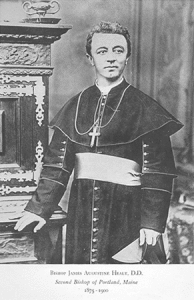
Rev. James A. Healy, D.D.
Bishop Bacon’s successor, James Augustine Healy, was appointed February 12, 1875, and consecrated as Bishop of Portland at the Cathedral of the Immaculate Conception (see Cathedral) on June 2, 1875.
James Augustine Healy became the first black bishop ordained in the United States. He was the son of an Irish immigrant, Michael Healy, who became a prosperous plantation-owner in Georgia, and a mulatto woman who was actually a slave.
James was educated in northern schools and later attended the newly established Holy Cross College. There he made his decision to enter the priesthood. He furthered his studies in Montreal and Paris where he was ordained in 1854 at the Cathedral of Notre Dame.
After ordination Father Healy was assigned to Bishop John Fitzpatrick’s Boston Diocese. He remained there serving first at the House of the Angel Guardian, then as Chancellor of the Diocese and finally as pastor of St. James Church. When his appointment came as the second Bishop of Portland, he was forty-five years old. (more…)
Black History, Other, Religion
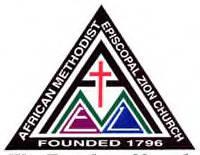 Eliza Ann Gardner is regarded as the “mother” of the African Methodist Episcopal Zion (AMEZ) Missionary Society and was one of New England’s most tenacious defenders of women’s equality in religious matters.
Eliza Ann Gardner is regarded as the “mother” of the African Methodist Episcopal Zion (AMEZ) Missionary Society and was one of New England’s most tenacious defenders of women’s equality in religious matters.
She was born in New York City on May 28, 1831, the daughter of James and Eliza Gardner. When she was young, the family moved to the predominantly black West End section of Boston, where her father enjoyed a profitable career as a contractor for sailing vessels. His work made it possible for Gardner to enjoy a comfortable childhood, but she quickly learned that many others of her race were less fortunate, and was taught that she had an obligation to help them. Her family was active in the local African Methodist Episcopal Church, and their home served as a station for the Underground Railroad, which smuggled runaway slaves from the South to freedom.
Gardner’s interest in slavery intensified because of her education at the only public school for black children in the city, which was taught by abolitionist teachers. As a result, she became acquainted with many nationally famous abolitionist leaders. An excellent student, Gardner earned a number of scholarships. However, as few black women at the time were able to pursue higher education or professional careers, she learned the art of dressmaking to support herself once she finished school. (more…)





